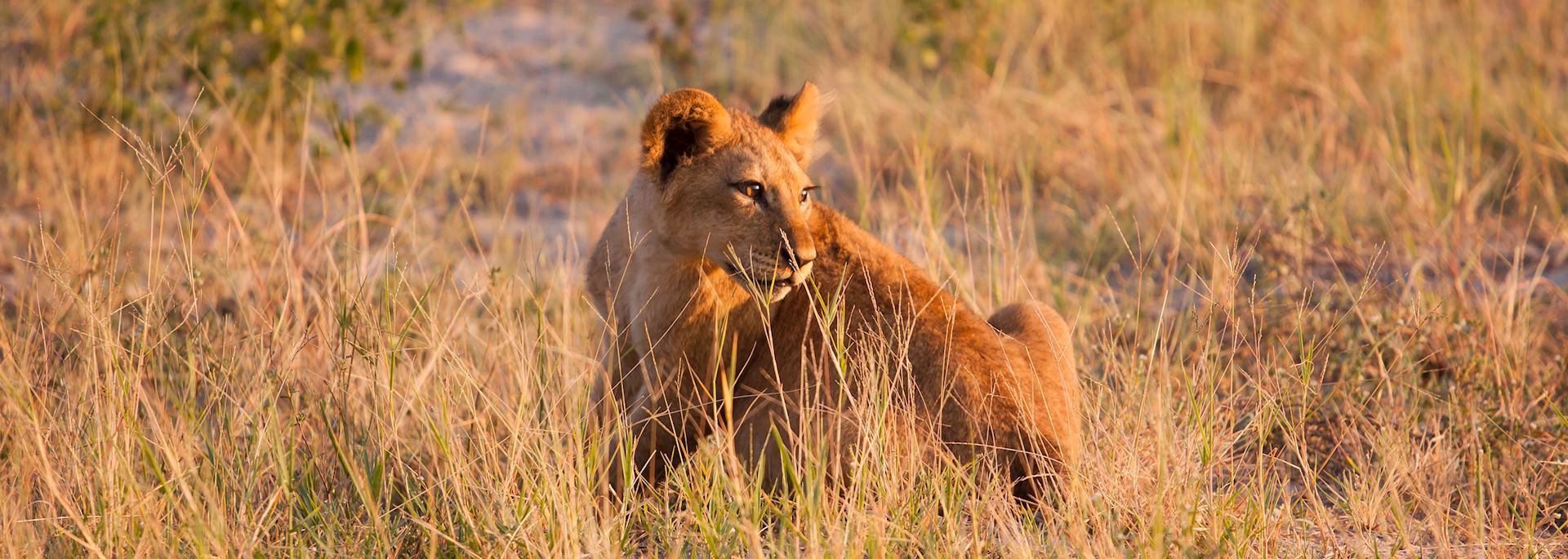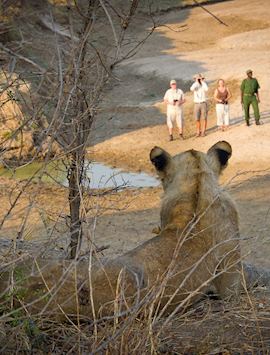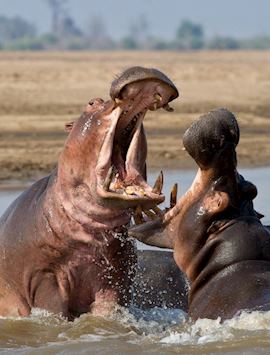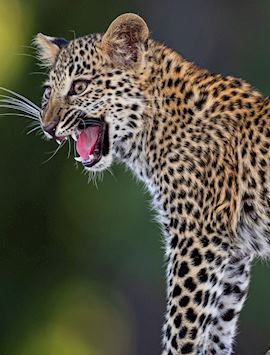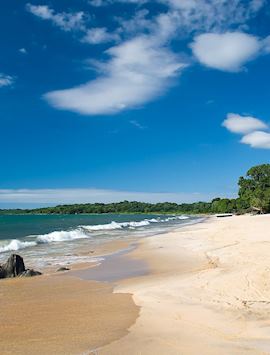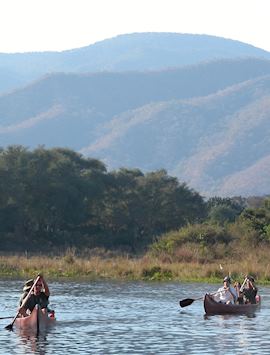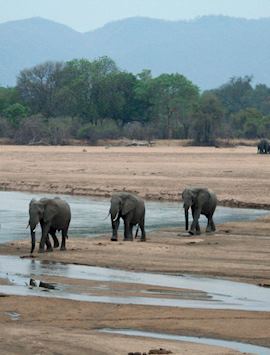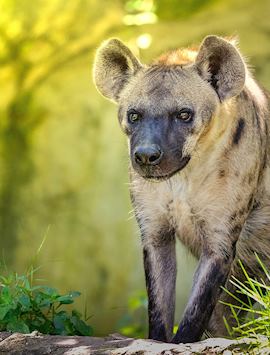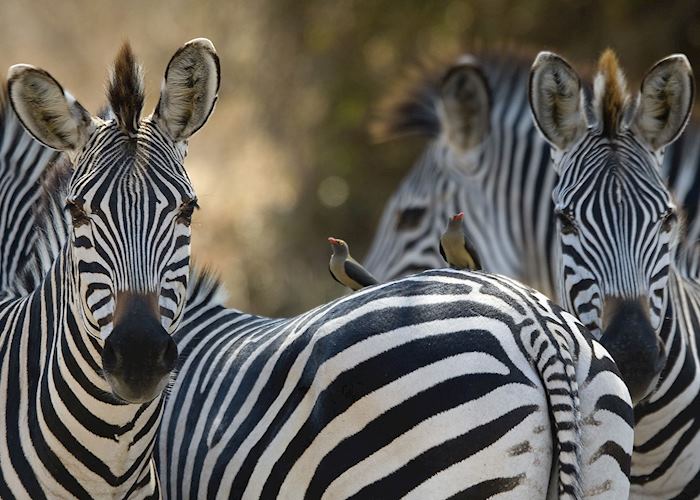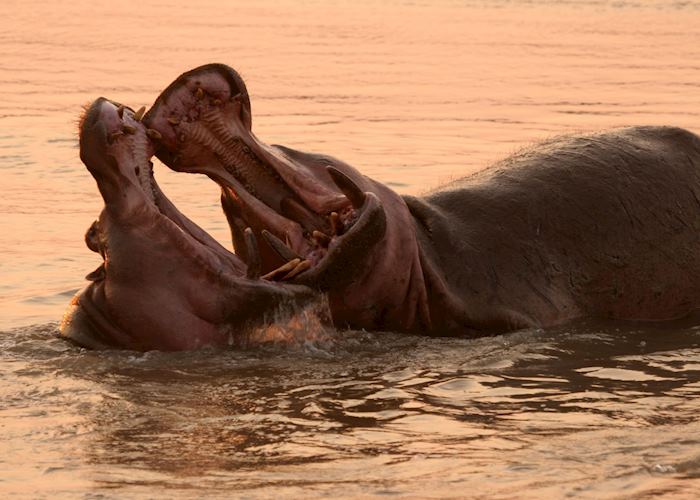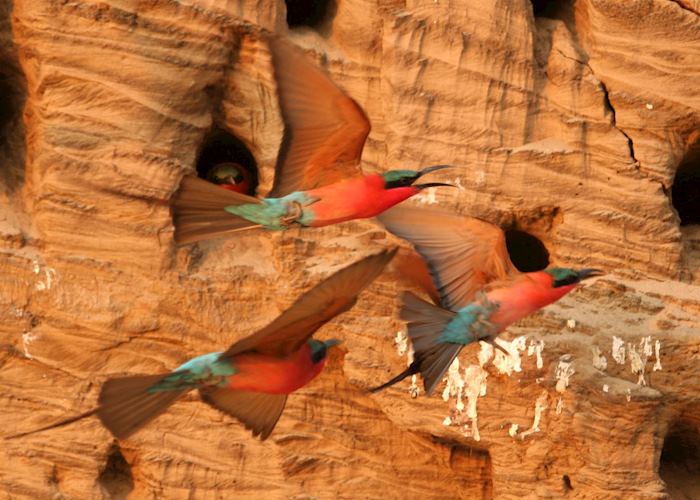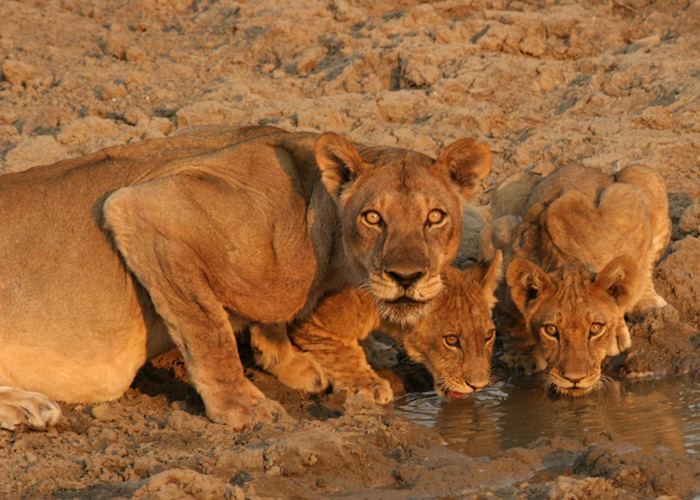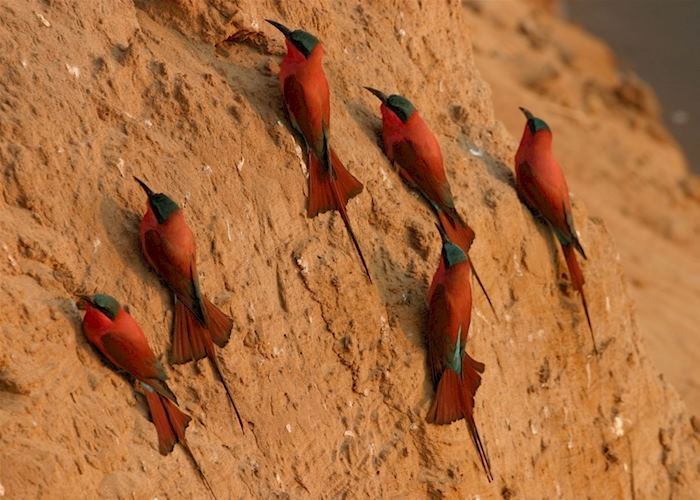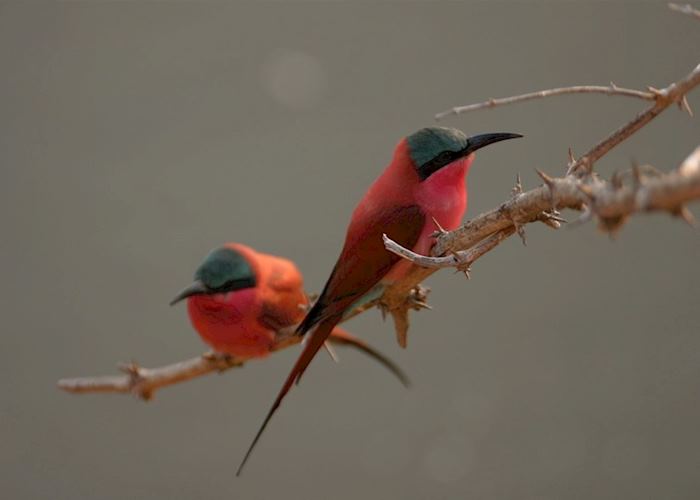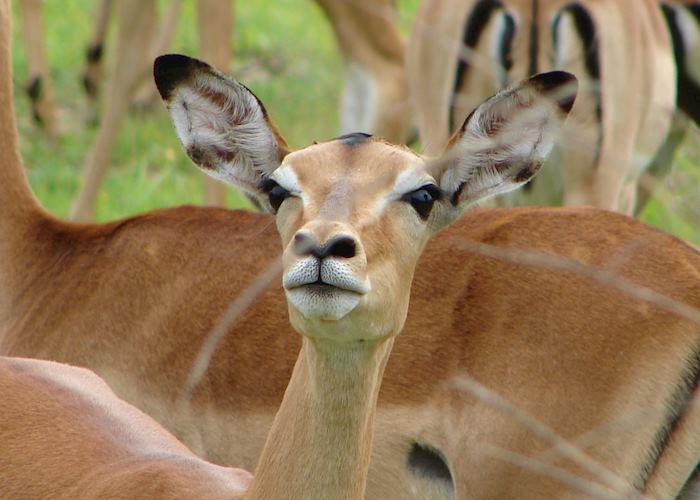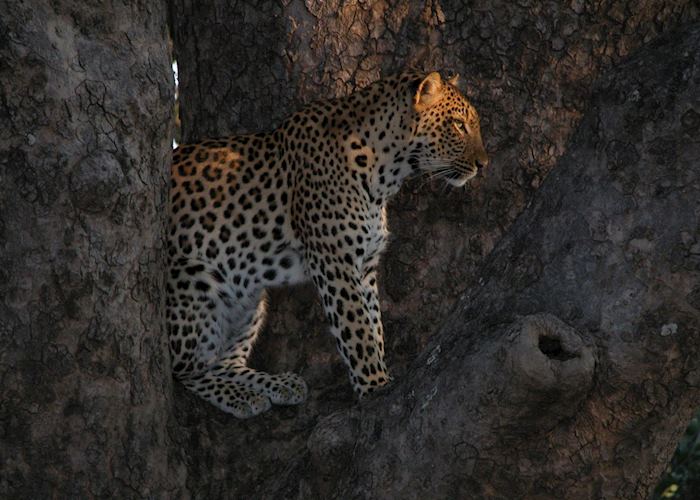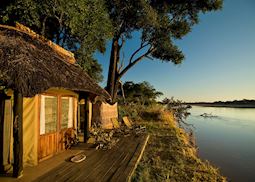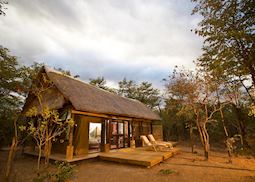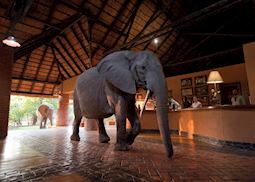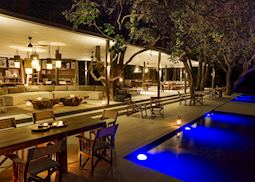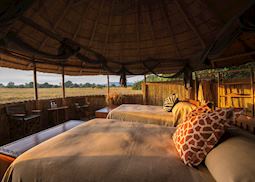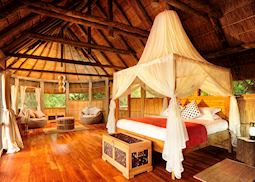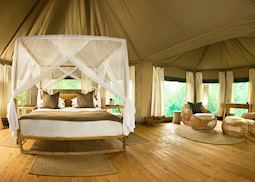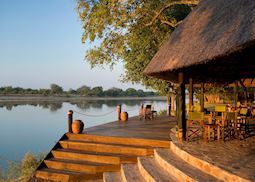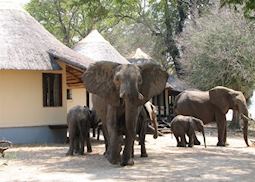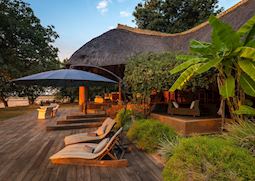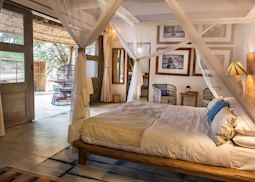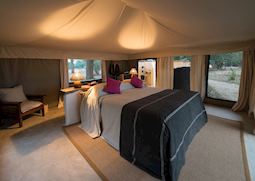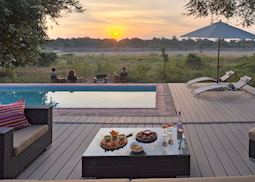Jump to:
Zambia's most famous safari destination, South Luangwa National Park is tropical, wild, beautiful and full of game.
Situated in a wide rift valley, the park is flanked by the Muchinga escarpment to the west and the meandering Luangwa River to the east.
Wildlife of South Luangwa National Park
Much of the game is found near the river, with herds of elephant and buffalo descending the dusty banks to drink. Large crocodiles laze on sandbanks and at dusk hundreds of hippo leave their pools and lumber up the banks to graze. Impala and puku are common and the beautiful Thornicroft’s giraffe can be seen in the dappled forests. Cookson’s wildebeest, Crawshay’s zebra, waterbuck, bushbuck, grysbok and oribi are also found. Predators abound with lion and spotted hyena, while the leopard are always a highlight.
Birdlife
Finally, there are over 400 species of bird with highlights including flocks of crowned cranes, colonies of carmine bee-eaters and a breeding colony of yellow-billed stork.
Walking safaris
Walking safaris are a speciality in the Luangwa. Accompanied by guides and scouts, walks explore the riverbanks and pretty dambos with their green Nile cabbage and crocodiles. There are also day and night drives in open 4x4s.
The Green Season
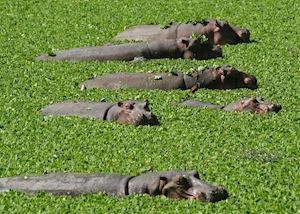 In November the Luangwa receives its first rains. Short downpours followed by warm sunshine lead to an explosion of vegetation. Grass grows to six feet tall, trees flower, pans fill and rivers burst their banks. Animals take advantage of the abundant food to give birth to young, and flocks of migrant birds arrive. It’s a time of plenty, when the parks are colourful and bursting with life.
In November the Luangwa receives its first rains. Short downpours followed by warm sunshine lead to an explosion of vegetation. Grass grows to six feet tall, trees flower, pans fill and rivers burst their banks. Animals take advantage of the abundant food to give birth to young, and flocks of migrant birds arrive. It’s a time of plenty, when the parks are colourful and bursting with life.
During the rains Kapani, Nkwali and Tafika run green season safaris exploring the tributaries, flooded pans and accessible plains. These are superb for birdwatching and seeing Africa at its most vibrant.
who's been there

Start planning your tailor-made trip to South Luangwa National Park by contacting one of our Zambia specialists
-
01993 838 92501993 838 505
- Make an enquiry
Suggested itineraries featuring South Luangwa National Park
Our itineraries will give you suggestions for what is possible when you travel in South Luangwa National Park, and they showcase routes we know work particularly well. Treat them as inspiration, because your trip will be created uniquely by one of our specialists.
Places near South Luangwa National Park
- North Luangwa National Park 94 miles away
- Shiwa Ngandu 137 miles away
- Bangweulu Wetlands 173 miles away
- The Lower Zambezi National Park 201 miles away
- Lusaka 266 miles away
Photos of South Luangwa National Park
Accommodation choices for South Luangwa National Park
We've selected a range of accommodation options for when you visit South Luangwa National Park. Our choices usually come recommended for their character, facilities and service or location. Our specialists always aim to suggest properties that match your preferences.
-
![Mchenja Bushcamp, South Luangwa National Park]()
Mchenja Bushcamp
South Luangwa National Park -
![Zungulila Bushcamp, South Luangwa National Park]()
Zungulila Bushcamp
South Luangwa National Park -
![Chamilandu Bushcamp, South Luangwa National Park]()
Chamilandu
South Luangwa National Park -
![Mfuwe Lodge, South Luangwa National Park]()
Mfuwe Lodge
South Luangwa National Park -
![Chinzombo Camp, South Luangwa National Park]()
Chinzombo Camp
South Luangwa National Park -
![Kuyenda Bushcamp, South Luangwa National Park]()
Kuyenda Bushcamp
South Luangwa National Park -
![Bilimungwe Bushcamp, South Luangwa National Park]()
Bilimungwe
South Luangwa National Park -
![Chindeni Bushcamp, South Luangwa National Park]()
Chindeni Bushcamp
South Luangwa National Park -
![Nkwali Safari Camp, South Luangwa National Park]()
Nkwali Camp
South Luangwa National Park -
![Nsefu Camp, South Luangwa National Park]()
Nsefu Camp
South Luangwa National Park -
![Luangwa River Camp, South Luangwa National Park]()
Luangwa River Camp
South Luangwa National Park -
![Kaingo Camp, South Luangwa National Park]()
Kaingo Camp
South Luangwa National Park -
![Tena Tena, South Luangwa National Park]()
Tena Tena
South Luangwa National Park -
![Flatdogs Camp, South Luangwa National Park]()
Flatdogs Camp
South Luangwa National Park -
![Lion Camp, South Luangwa National Park]()
Lion Camp
South Luangwa National Park

